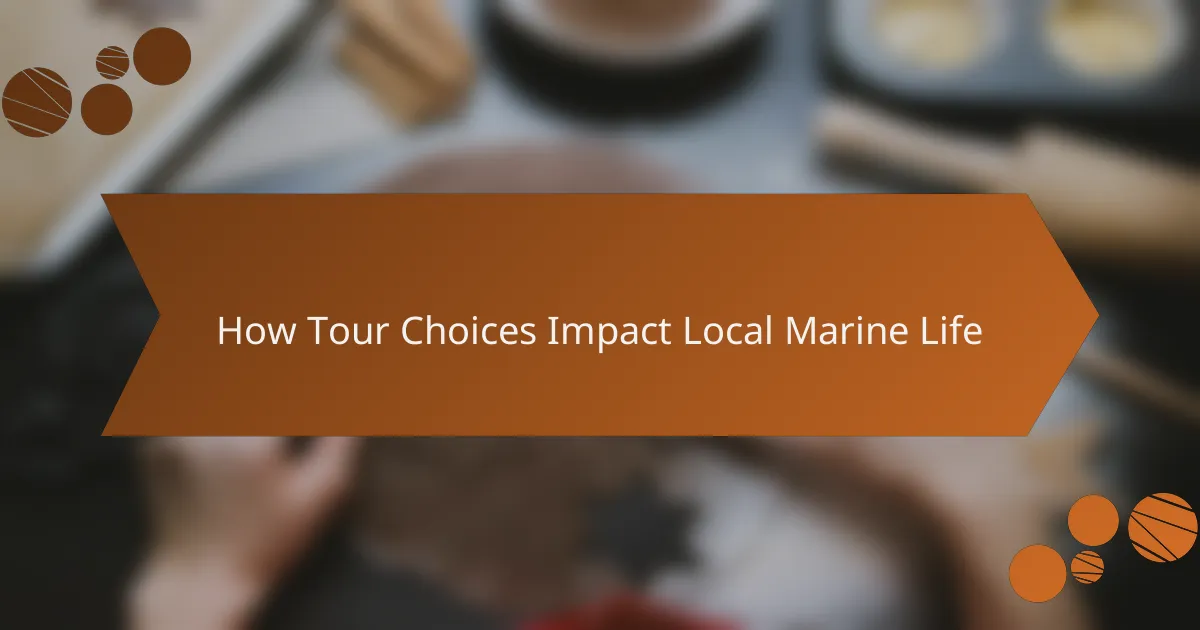Tour choices play a crucial role in shaping the health of local marine life, as they can either disrupt habitats or support conservation efforts. By selecting eco-friendly tours that prioritize sustainability, tourists can help protect marine ecosystems while enjoying their experiences. Additionally, local businesses that engage in responsible practices contribute to the preservation of these vital environments and attract environmentally conscious visitors.
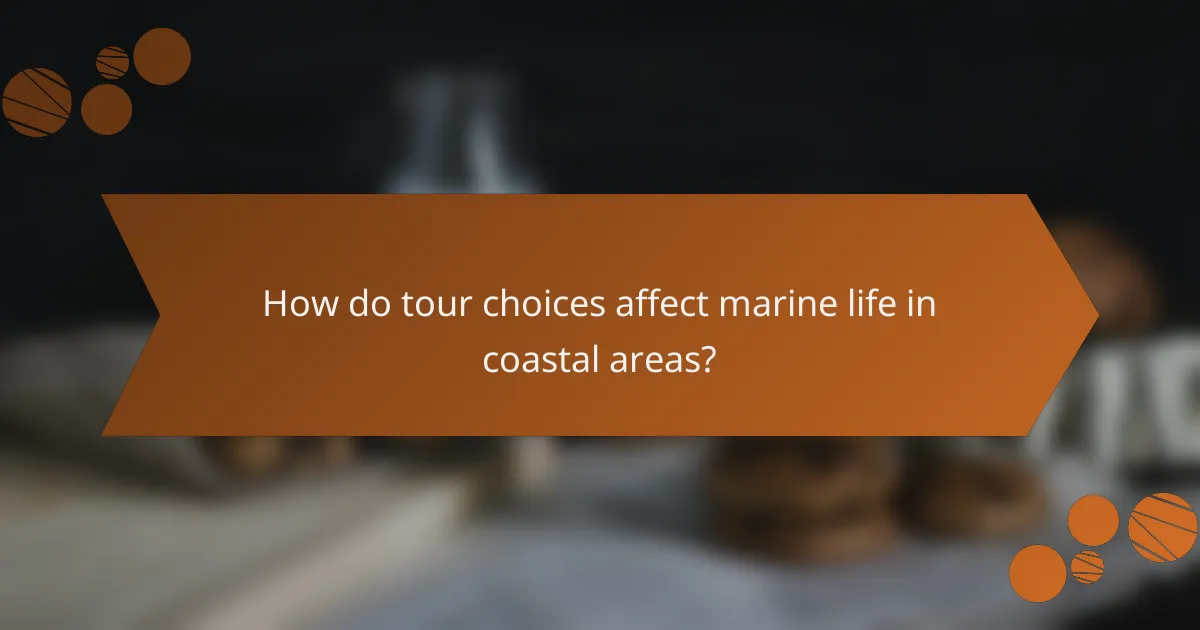
How do tour choices affect marine life in coastal areas?
Tour choices significantly impact marine life in coastal areas by influencing habitat disturbance, fish populations, and conservation efforts. The type and frequency of tours can either harm or help local ecosystems, depending on how they are managed and conducted.
Impact of boat traffic on marine habitats
Boat traffic can lead to habitat degradation in coastal areas by causing physical damage to sensitive ecosystems like coral reefs and seagrass beds. Increased noise and pollution from boats can disrupt the natural behaviors of marine species, particularly during breeding and feeding times.
To mitigate these effects, tour operators should adhere to established guidelines, such as maintaining safe distances from wildlife and limiting the number of vessels in sensitive areas. Implementing designated routes can also help minimize disturbances to marine habitats.
Effects of fishing tours on local fish populations
Fishing tours can have a significant impact on local fish populations, especially if they are not regulated. Overfishing can deplete stocks, disrupt food chains, and lead to long-term ecological imbalances. Sustainable fishing practices are essential to ensure that fish populations remain healthy.
Tour operators should promote catch-and-release practices and educate participants on local regulations regarding size and bag limits. This approach helps maintain fish populations while still allowing tourists to enjoy fishing experiences.
Influence of eco-tours on conservation efforts
Eco-tours can positively influence conservation efforts by raising awareness about marine ecosystems and promoting responsible tourism. These tours often include educational components that inform participants about the importance of protecting marine life and habitats.
By supporting eco-tourism, travelers can contribute to local economies while fostering conservation initiatives. Tour operators can enhance their impact by partnering with local conservation organizations and reinvesting a portion of tour proceeds into habitat restoration projects.
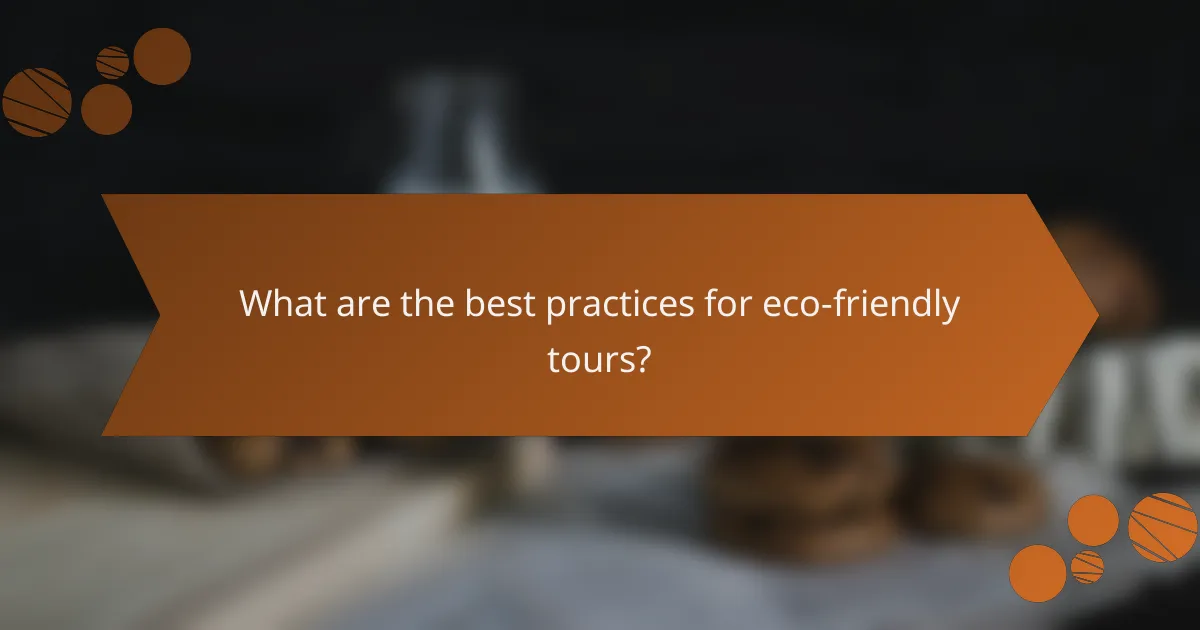
What are the best practices for eco-friendly tours?
Eco-friendly tours prioritize the protection of marine life and habitats while providing enjoyable experiences for participants. Best practices include minimizing environmental impact, respecting wildlife, and supporting local communities.
Guidelines for sustainable boating
To ensure sustainable boating, choose vessels that use eco-friendly fuels or are electric. Limit the number of passengers to reduce overcrowding and minimize disturbances to marine ecosystems.
Always adhere to local regulations regarding speed limits and no-wake zones, which help protect sensitive habitats. Additionally, avoid anchoring on coral reefs and use designated mooring buoys instead.
Best practices for responsible fishing
Responsible fishing practices include using selective gear to reduce bycatch and adhering to local catch limits to prevent overfishing. Familiarize yourself with local regulations regarding protected species and seasonal restrictions.
Consider catch-and-release methods for non-target species to help maintain population levels. Educating yourself on sustainable seafood choices can also support healthier marine ecosystems.
Eco-tourism certifications in marine environments
Look for eco-tourism certifications that indicate a commitment to sustainability in marine environments. Certifications such as the Marine Stewardship Council (MSC) and the Rainforest Alliance signify adherence to environmental standards.
These certifications often require operators to demonstrate responsible practices, including habitat conservation and community engagement. Supporting certified operators helps ensure that your tourism activities benefit both the environment and local economies.
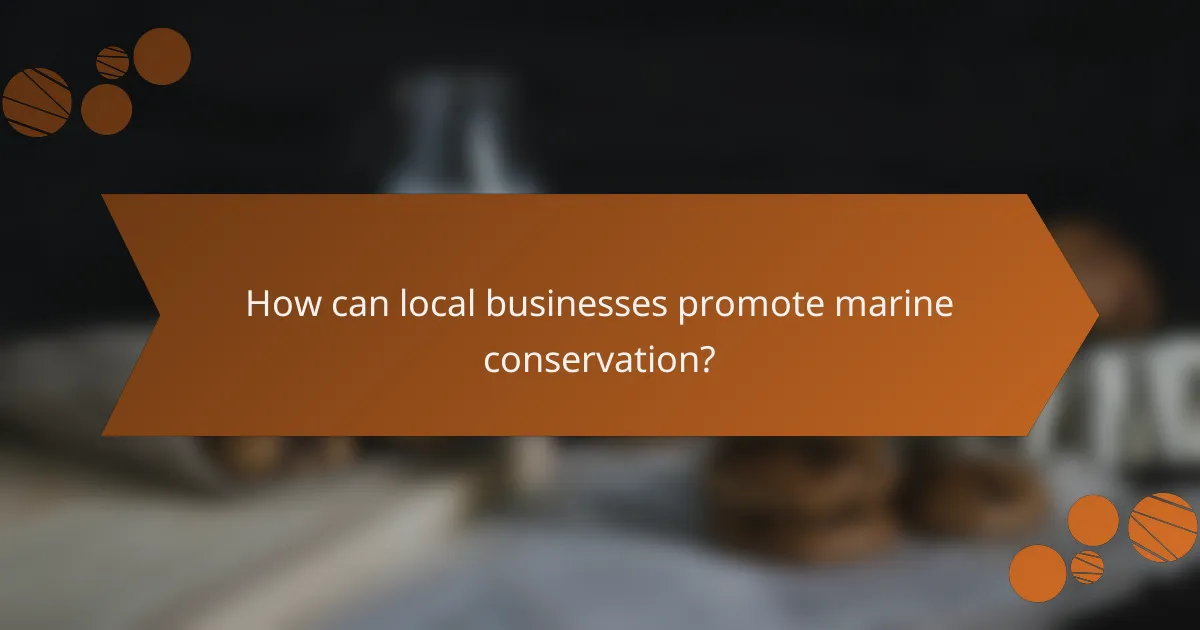
How can local businesses promote marine conservation?
Local businesses can promote marine conservation by actively engaging in sustainable practices and collaborating with conservation organizations. These efforts not only protect marine ecosystems but also enhance the community’s reputation and attract eco-conscious tourists.
Partnerships with conservation organizations
Forming partnerships with conservation organizations allows local businesses to leverage expertise and resources in marine protection. Collaborations can include joint initiatives such as beach clean-ups, habitat restoration projects, or fundraising events to support marine research.
Businesses can also benefit from co-branding opportunities, which can enhance their visibility and appeal to environmentally aware customers. For example, a local dive shop might partner with a marine research group to offer eco-tours that educate participants about local marine life and conservation efforts.
Community engagement initiatives
Engaging the local community in marine conservation initiatives fosters a sense of ownership and responsibility towards marine ecosystems. Businesses can organize workshops, volunteer days, or informational sessions that encourage community members to participate in conservation efforts.
For instance, a restaurant could host a monthly event where a portion of the proceeds goes to local marine conservation projects, thereby raising awareness and funds simultaneously. This not only supports conservation but also builds customer loyalty.
Educational programs for tourists
Implementing educational programs for tourists is an effective way to promote marine conservation. Local businesses can offer guided tours, workshops, or informational brochures that highlight the importance of protecting marine life and ecosystems.
For example, a kayaking company might provide briefings on local marine species and their habitats before tours, emphasizing responsible practices like avoiding wildlife disturbance. This approach not only enriches the tourist experience but also encourages sustainable behaviors among visitors.
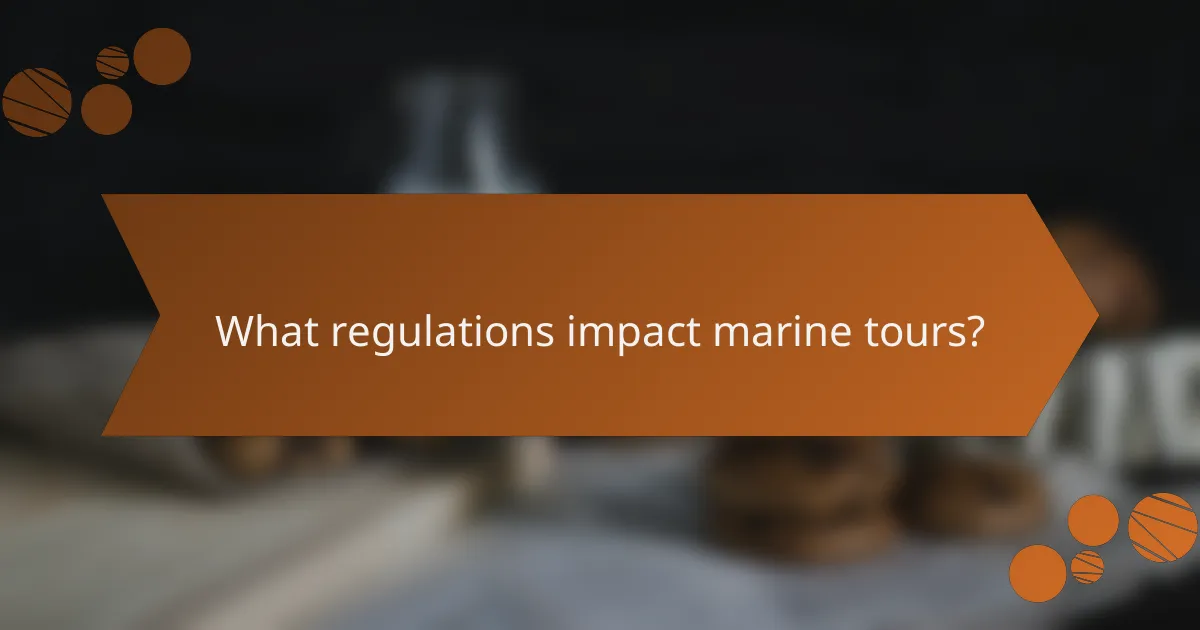
What regulations impact marine tours?
Marine tours are subject to various regulations that aim to protect local ecosystems while ensuring safe and responsible tourism. These regulations can include fishing limits, permit requirements, and environmental protection laws that govern how tours operate and interact with marine life.
Local fishing regulations in California
California has strict local fishing regulations designed to preserve fish populations and marine habitats. These regulations often include seasonal closures, size limits, and catch quotas that vary by species. For instance, certain fish may only be caught during specific months to allow for breeding cycles.
Tour operators must stay informed about these regulations to avoid penalties and ensure sustainable practices. It is advisable for operators to regularly check updates from the California Department of Fish and Wildlife to remain compliant.
Permits required for marine tours
Operating a marine tour in California typically requires several permits, which can vary based on the type of tour and the areas visited. Common permits include those for commercial fishing, whale watching, and eco-tours. Each permit has specific application processes and fees that operators must navigate.
It is crucial for tour operators to obtain the necessary permits before launching any tours. Failure to do so can result in fines or the suspension of tour operations, impacting both business and local marine life.
Environmental protection laws affecting tour operations
Environmental protection laws in California, such as the Marine Life Protection Act, set guidelines for how marine tours can operate without harming ecosystems. These laws may restrict activities in sensitive areas, such as marine reserves, where human interaction is limited to protect biodiversity.
Tour operators should conduct regular training for staff on these laws to ensure compliance and promote environmentally friendly practices. Engaging in responsible tourism not only protects marine life but also enhances the experience for participants, fostering a greater appreciation for the environment.
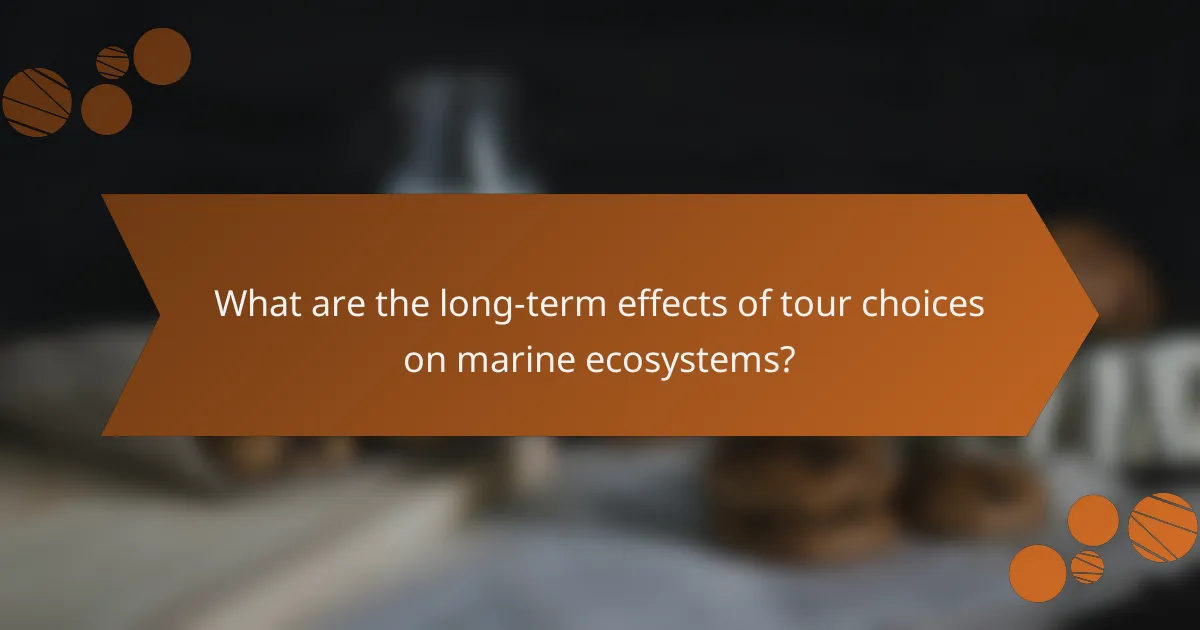
What are the long-term effects of tour choices on marine ecosystems?
Tour choices can significantly impact marine ecosystems over time, affecting species populations, habitat health, and overall biodiversity. Responsible tourism practices can help mitigate negative effects, while poor choices can lead to long-lasting damage to marine life.
Changes in species diversity
Tourism activities, such as snorkeling and diving, can alter species diversity in marine environments. Increased human presence may lead to disturbances that affect the behavior and reproduction of local species. Over time, this can result in a decline of sensitive species and an increase in more resilient ones, disrupting the natural balance.
For example, in popular tourist destinations, certain fish species may become overfished, while others thrive due to reduced competition. This shift can diminish the overall diversity of marine life, making ecosystems less resilient to environmental changes.
Impact on coral reef health
Coral reefs are particularly vulnerable to the effects of tourism, as activities like anchoring boats and trampling can physically damage these delicate structures. Additionally, pollution from tour operations, such as sunscreen and waste, can lead to coral bleaching and disease, further compromising reef health.
Maintaining coral reef health is crucial for supporting diverse marine life. Implementing guidelines, such as designated mooring areas and educating tourists about reef-safe practices, can help protect these vital ecosystems from degradation.
Future trends in marine conservation tourism
As awareness of marine conservation grows, the tourism industry is increasingly adopting sustainable practices. Eco-tourism initiatives focus on minimizing environmental impact while promoting education and conservation efforts. This shift can lead to better protection of marine ecosystems and enhanced visitor experiences.
Future trends may include stricter regulations on tour operations, increased use of technology for monitoring marine health, and partnerships with local communities to promote responsible tourism. Tourists are encouraged to seek out operators who prioritize sustainability, ensuring their choices support marine conservation efforts.
